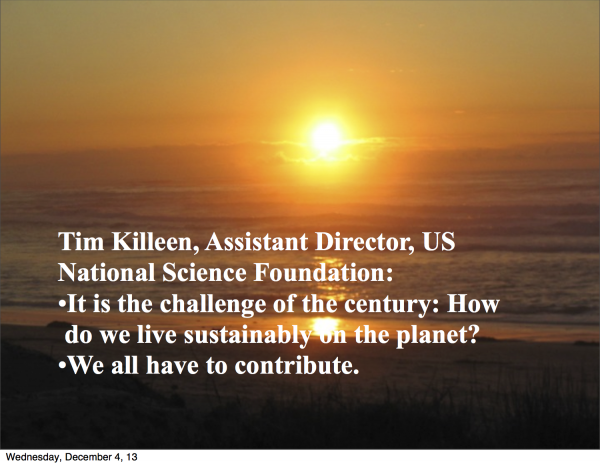
MPE 2013+, which extends MPE2013 into the future, is kicking off in January with a workshop, Mathematics of Planet Earth: Challenges and Opportunities – Introducing Participants to MPE 2013+ Topics, which will be held at Arizona State University January 7-10, 2014. The workshop aims to expose students and junior researchers to the challenges facing our planet, the role of the mathematical sciences in addressing those challenges, and the opportunities to get involved in the effort. Financial support is available to support participants to attend this workshop and to participate in follow-up activities. Some spots are still available. More information on the workshop and financial support is available here.
This workshop feeds into workshops reflecting six themes. In each case, there will be a workshop followed by other activities such as small group meetings, collaborations, miniworkshops, etc. While these activities are planned to initiate in the U.S., we look forward to involving partners all over the world. The initial workshops that reflect these themes are:
- Workshop on Sustainable Human Environments
Rapidly growing urban environments present new and evolving challenges. With recent advances in technology, we can infuse our existing infrastructures with new intelligence to sense, analyze, and integrate data, and respond intelligently to the needs of cities’ jurisdictions. This workshop explores the role of data in “smart cities,” anthropogenic biomes, and security.
Location: DIMACS-Rutgers University, April 23-25, 2014 - Workshop on Natural Disasters
No part of the world is impervious to natural disaster. Epidemics, earthquakes, floods, hurricanes, drought, tornadoes, wildfires, tsunamis, and extreme temperatures routinely take their toll. This workshop looks at how computational sciences can help in predicting, monitoring, and responding to such events, and mitigating their effects.
Location: Georgia Tech, May 13-15, 2015 - Workshop on Global Change
The planet is constantly changing, but the pace of change has accelerated as a result of human activity. We need to monitor global change to understand processes leading to change, learn how to mitigate and adapt to its effects, determine if we are meeting goals for our planet, and get early warning of dangerous trends. This workshop explores the observation and metrics used to measure the effects of global change.
Location: University of California-Berkeley, May 19-21, 2014 - Workshop on Management of Natural Resources
To maintain the long-term well-being of the global population, management of the world’s natural resources must emphasize conservation and renewal over depletion and spending. This workshop will investigate challenges for the computational sciences including models and algorithms that describe processes affecting water, forests, and food supplies. They involve complex adaptive systems that interconnect natural systems with human ones, thus calling for understanding of both types of systems.
Location: Howard University, June 4-6, 2015 - Workshop on Data-aware Energy Use
We need to make good choices about today’s energy investments, because they will be with us for a long time. Data can help us make better choices if we can surmount concomitant challenges. This workshop will explore harnessing data to address problems in energy, emphasizing four main areas: energy investment portfolios; smart grid; smart buildings; and electric vehicles.
Location: UC-San Diego, September 2014 - Workshop on Education for the Planet Earth of Tomorrow
The issues facing the planet call for a new type of workforce, trained in multidisciplinary and multinational communication and collaboration. To function in this rapidly changing world, students will need to appreciate the most important concepts at the interface between their discipline and others. There has never been a more crucial time to ensure that we train the next generation of scientists, engineers, and decision makers to be able to think broadly across disciplines. This workshop will bring together the educational findings of the previous five workshops with discussions focusing on workforce development and the MPE education plan.
Location: NIMBioS University of Tennessee, Fall, 2015
For more information on the MPE 2013+ Program, please click here or contact Eugene Fiorini at mpe2013p@dimacs.rutgers.edu.